ETHNICITY IN ANCIENT AMAZONIA
Ethnicity
IN ANCIENT AMAZONIA
Reconstructing Past Identities from Archaeology, Linguistics, and Ethnohistory
edited by
Alf Hornborg and Jonathan D. Hill
UNIVERSITY PRESS OF COLORADO
2011 by the University Press of Colorado
Published by the University Press of Colorado
5589 Arapahoe Avenue, Suite 206C
Boulder, Colorado 80303
All rights reserved
Printed in the United States of America

| The University Press of Colorado is a proud member of
the Association of American University Presses. |
The University Press of Colorado is a cooperative publishing enterprise supported, in part, by Adams State College, Colorado State University, Fort Lewis College, Metropolitan State College of Denver, Regis University, University of Colorado, University of Northern Colorado, and Western State College of Colorado.
 The paper used in this publication meets the minimum requirements of the American National Standard for Information SciencesPermanence of Paper for Printed Library Materials. ANSI Z39.48-1992
The paper used in this publication meets the minimum requirements of the American National Standard for Information SciencesPermanence of Paper for Printed Library Materials. ANSI Z39.48-1992
Library of Congress Cataloging-in-Publication Data
Ethnicity in ancient Amazonia : reconstructing past identities from archaeology, linguistics, and
ethnohistory / Alf Hornborg and Jonathan D. Hill, editors.
p. cm.
Includes bibliographical references and index.
ISBN 978-1-60732-094-4 (hardcover : alk. paper) ISBN 978-1-60732-095-1 (e-book) 1.
Indians of South AmericaAmazon River RegionEthnic identity. 2. Indians of South America
Amazon River RegionLanguages. 3. Indians of South AmericaAmazon River Region
Antiquities. 4. Anthropological linguisticsAmazon River Region. 5. EthnicityAmazon River
Region. 6. EthnohistoryAmazon River Region. 7. Amazon River RegionEthnic relations. 8.
Amazon River RegionAntiquities. I. Hornborg, Alf. II. Hill, Jonathan David, 1954
F2519.1.A6E865 2011
305.8009811dc23
2011028920
Design by Daniel Pratt
20 19 18 17 16 15 14 13 12 11 10 9 8 7 6 5 4 3 2 1
Figures
.
Maps
Tables
Preface
This volume builds on three conferences on past processes of ethnic identity formation in Amazonia.
The first meeting, Mapping Culture: Geographical Information Systems in the Human Sciences, was held at Lund University, November 2729, 2006. It addressed questions on how digital cartography can help us reconstruct the expansion and decline of cultural identities over time. Participants included David Andersson, sten Dahl, Love Eriksen, Rafael Gassn, Chris Gillam, Jonathan Hill, Alf Hornborg, Dirse Kern, and Alberta Zucchi.
The second meeting, Long-term Patterns of Ethnogenesis in Indigenous Amazonia, was a session at the 106th Annual Meeting of the American Anthropological Association, in Washington DC, on November 30, 2007. The panel was organized and chaired by Alf Hornborg and Jonathan Hill. Additional participants included William Bale, Warren DeBoer, Meredith Dudley, Michael Heckenberger, Eduardo Neves, Fernando Santos-Granero, Kay and Franz Scaramelli, Eduardo Viveiros de Castro, and Neil Whitehead.
The third meeting, Amazonian Ethno-Linguistics, was held at Lund University, June 24, 2008. It focused on linguistic aspects of ethnogenesis in Amazonia. Papers were presented by, among others, Ellen Basso, Eithne Carlin, Swintha Danielsen, Sidney da Silva Facundes, Jonathan Hill, Pieter Muysken, Wany Sampaio, Chris Sinha, Pirjo Virtanen, and Hein van der Voort.
The editors thank all the participants in these meetings for their contributions and constructive discussions. Alf Hornborg gratefully acknowledges financial support for the meetings from Gyllenstiernska Krapperupstiftelsen, the Erik Philip-Srensen Foundation, the Royal Society of Letters at Lund, the Elisabeth Rausing Memorial Foundation, and the Linnaeus-Palme Exchange Programme. He is also grateful to the Bank of Sweden Tercentenary Foundation for supporting his work in coediting this volume.
ALF HORNBORG AND JONATHAN D. HILL
ETHNICITY IN ANCIENT AMAZONIA
CHAPTER ONE
Introduction: Ethnicity in Ancient Amazonia
Alf Hornborg and Jonathan D. Hill
By endowing nations, societies, or cultures with the qualities of internally homogeneous and externally distinctive and bounded objects, we create a model of the world as a global pool hall in which the entities spin off each other like so many hard and round billiard balls.
ERIC R. WOLF, EUROPE AND THE PEOPLE WITHOUT HISTORY (:6)
STEPS TOWARD AN ANTI-ESSENTIALIST ANTHROPOLOGY OF AMAZONIA
Attempts to explain the distribution of indigenous languages and ethnic groups in Amazonia since the time of European contact, whether by historians, linguists, or archaeologists, have generally been founded on an essentialist conception of ethnolinguistic groups as more or less bounded, genetically distinct populations that have reached their recent territories through migration. This perception of ethnolinguistic diversity is a phenomenon that itself deserves explanation, as it appears to draw on a Eurocentric experience of nation-building that historically has ). Correlations of data on the physical geography, linguistics, archaeology, and ethnohistory of Amazonia indicate that ethnolinguistic identities and boundaries have been continuously generated and transformed by shifting conditions such as economic specialization, trade routes, warfare, political alliances, and demography. To understand the emergence, expansion, and decline of cultural identities over the centuries, we thus need to consider the roles of diverse conditioning factors such as ecological diversity, migration, trade, epidemics, conquest, language shifts, marriage patterns, and cultural creativity.
The concept of ethnicity that we apply to long-term processes of collective identity formation in Amazonia draws on mainstream definitions within social and cultural anthropology (). Ethnicity in the last sense is negotiated in the continuous, fluid dialectic between objective sociocultural features and subjective experiences of identity. The three approaches need not be mutually exclusive, Sokolovskii and Tishkov suggest, but the constructivist approach offers the most promising core of an emergent, coherent theory of ethnicity (ibid.). This conclusion would no doubt be endorsed by a majority of cultural anthropologists today. What is novel about the present volume, however, is the ambition to allow this perspective from cultural anthropology and ethnography to fertilize studies of the archaeology and historical linguistics of Amazonia. Although the contributors to Ethnicity in Ancient Amazonia represent several disciplines and may employ slightly different definitions of ethnicity (e.g., DeBoer, this volume; Scaramelli and Scaramelli, this volume), they all make serious efforts toward this end.
If ethnicity is understood as a means of communicating a groups distinctness, we need to explore criteria for recognizing expressions of identity in the past use of language, material culture, and other ethnic markers, acknowledging also that such use may be context-specific, and to trace the specific ways in which Amazonian experiences of distinctness and difference have been shaped by spatially distributed circumstances largely defined by the macro-scale logic of economic and political structures. Rather than treat human history in the area as explicable in terms of biogeography, this approach to the archaeology, linguistics, and ethnohistory of ancient Amazonia seeks explanations in social and cultural processes.
Next page

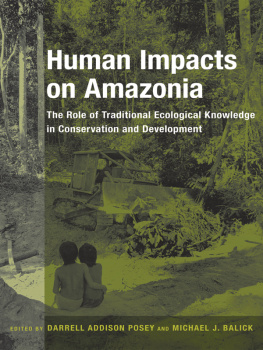
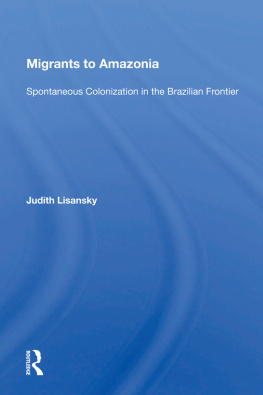
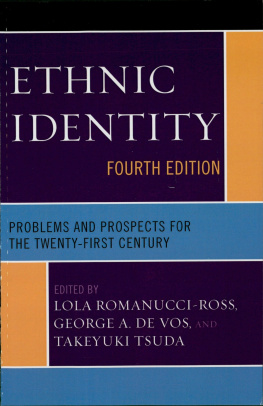
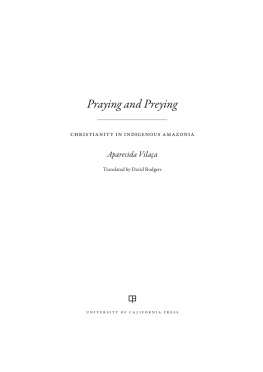
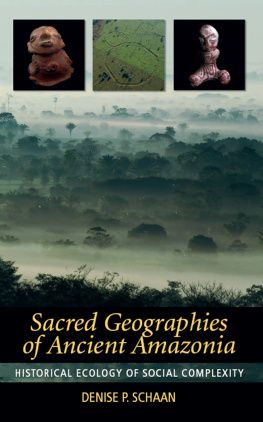
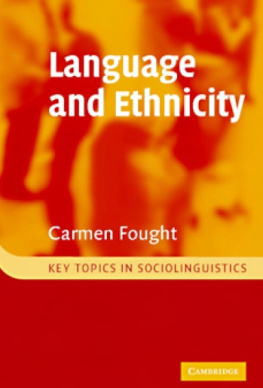

 The paper used in this publication meets the minimum requirements of the American National Standard for Information SciencesPermanence of Paper for Printed Library Materials. ANSI Z39.48-1992
The paper used in this publication meets the minimum requirements of the American National Standard for Information SciencesPermanence of Paper for Printed Library Materials. ANSI Z39.48-1992